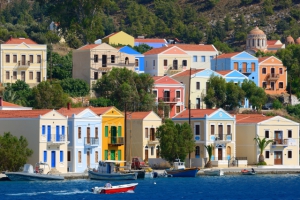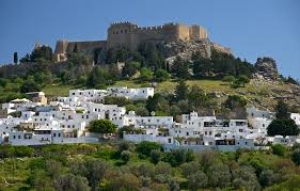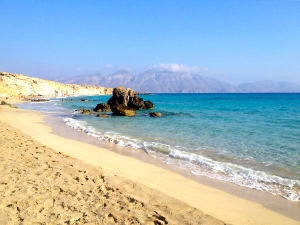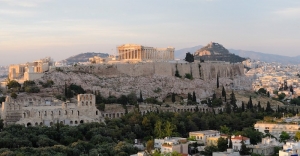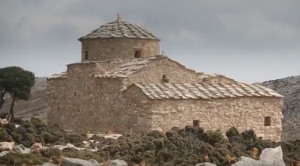XpatAthens
Friday, 08 May 2015 10:04
Possible Flat Rate VAT At 18%
The flat value-added tax rate being considered by the government will have to be set at 18 percent in order to have a neutral impact (neither positive nor negative) on its revenues. A lower rate of 16 percent, which is apparently being considered by the government, appears not to have been accepted by Greece’s creditors as it would create a fiscal gap and would entail additional austerity measures.
There are currently three VAT rates (6.5, 13 and 23 percent), as well as a 30 percent discount on each for the Aegean islands. The Finance Ministry has calculated that the average rate comes to 17.025 percent; however, it is also planning to exempt certain drugs and a number of food items, which means that the single rate will have to be pushed up to 18 percent to have a neutral impact on revenues.
If the measure passes and the flat rate of 18 percent is imposed from the second half of the year, households will face a significant added burden as the bulk of their expenses are food and electricity, both of which currently carry a 13 percent VAT rate.
Brussels counters that VAT evasion will be reduced with the introduction of a flat rate, noting that most of the tax dodging concerns services taxed at 23 percent. This was the case when the previous government reduced the rate on catering from 23 to 13 percent.
To read more, please visit: eKathimerini.
Published in
Local News
Tagged under
Wednesday, 08 July 2015 07:00
Secret Greece: 15 Islands You've Never Heard Of
Off the beaten track alternatives to Rhodes, Corfu and Santorini.
Looking for untouched beauty, seclusion and quiet for your next holiday? There are a whole host of Greek islands overlooked by tourists that make for an off-the-beaten-track island escape in Europe.
Forget the hordes of holidaymakers in Kos and Corfu. These undiscovered hideways offer picturesque harbours, authentic villages and traditional Greek cuisine. Love beaches? The pebbly and sandy stretches on these remote islands are just how you like them: tranquil, unspoilt and totally sun-drenched . There's no shortage of ways to stay active on your Greek island getaway, either, as the nature and wildlife on these islands are just waiting to be explored: think waterfalls, hiking trails with sunset views and thermal springs.
If you're in need of a true island escape in Greece, these are the secret places for you. Folegandros (pictured) boasts sugar-cube whitewashed houses, pristine beaches and one of the most appealing clifftop villages in the Cyclades. In unique Chios, you can observe the beautiful village of Pyrgi, with its buildings finely decorated in grey and white geometric shapes. For those who appreciate a pretty harbour, don't miss Symi. This island has one of the most picturesque harbours in Greece, showing off impeccable architecture, cafes and a slow pace of life, unlike its neighbour Rhodes.
Want to experience the Greek islands without the crowds? Here's where you should go...
Kastellorizo
The pretty island of Kastellorizo, which lies 110km east of Rhodes, has a main town that unfolds around the natural harbour with unique architecture and colourful houses. The island's is home to a cluster of islets and offers a wealth of marine life to discover in its clear blue seas. Around the island you'll find cafes, tavernas and shops. The medieval castle and archaeological and folklore museums are several top attractions to visit when you're not at the beach. As tourism is yet to develop you'll only find a selection of hotels - a good place to experience true Greek island life.
Chios
The lesser-known isle of Chios is a unique gem in the north-eastern area of the Aegean Sea. It is best known for its cultivation and production of mastic, an aromatic resin that comes from trees that grow in the Mastihohoria region and forms in teardrop shapes. Pyrgi is one of the island's most beautiful villages, characterised by the fine decoration of its houses featuring grey and white geometric shapes.
Hydra
One of the most romantic places in Greece, Hydra overlooks the Argosaronic gulf and is home to traditional stone mansions, narrow cobbled streets and secluded squares. Cars are banned so people get around by donkey and its heart is the waterfront, featuring picturesque streets, museums, churches and cafés. Hydra is a popular day trip destination from Athens and its best beaches include Limnioniza, Spiliá and Ayios Nikolaos.
Karpathos
Karpathos is part of the Dodecanese complex and lies east of Crete. It is one of Greece's best-kept secrets, a mountainous island full of fresh water springs, vineyards and pine-tree forests. Karpathos' rock caves are home to Mediterranean monk seals and around the island there are marvellous hiking paths, secluded beaches and pretty villages, such as Othos and Olympos.
Schinoussa
Schinoussa is a small island that lies to the south of Naxos and boasts stony landscape that is both beautiful and unspoilt. It is part of the Minor Cyclades group of islands and has just three villages: Chora, Messaria and Mersini. As the island's port, Mersini, once a hideout for pirates, is a haven for small boats and a popular mooring spot for sailing enthusiasts. While on the island, enjoy hiking to observe the unspoilt natural beauty of the island, discover the 15 idyllic beaches and don't miss a walk through the picturesque village of Chora.
To read more, please visit: TravelAol
Published in
Travel Greece
Tagged under
Monday, 07 December 2015 07:00
Rhodes Vies For European Cultural Capital 2021
Rhodes is officially in the running for the title of European Cultural Capital 2021, after municipal authorities submitted the Dodecanese island’s bid.
Rhodes Mayor Fotis Chatzidiakos described the bid as a “journey that has just set off from its first port”.
“This is the result of painstaking work done over many months… Rhodes aims to establish itself as an influential destination historically, one of intellectual development in the sciences and the arts, and as a center of dissemination of European ideals,” the mayor added.
“At the moment, the world is observing Greece and Europe as a whole struggling with massive issues: immigration, refugees, religious dogmatism and extremism, conflicts and economies of different speeds. It is vital that Europe regain its credibility as a strong economic center and one of compassion,” Mr Chatzidiakos said.
To read more, please visit: Greek Travel Pages
Published in
Greece In The News
Tagged under
Tuesday, 09 July 2019 07:00
Athens Heat Alert
Hot air masses from Africa that reached Greece on Sunday will affect the weather until Wednesday, according to the National Observatory's Meteo weather service.
The intense heatwave is expected to affect several parts of Greece, with temperatures rising to 35°C and above.
Temperatures are expected to drop significantly on Thursday.
Get A Weather Forecast For Athens
Published in
Local News
Tagged under
Tuesday, 20 September 2016 07:00
Unchartered & Uninhabited Island Destinations In Greece
Greece is made up of a half a dozen archipelagos making it easy to see how there are a plethora of amazing uninhabited islands around Greece that visitors can add to their list of places to visit on their next Grecian holiday!
Keros Island
Located northwest of Amorgos, Keros island is a part of the Koufonissia islands and boasts important archaeological sites and excavations. Archaeologist have uncovered ruins from the Early Cycladic period 3200-2000 BC and in ancient times, it was called Keria. The beaches have white sand and the water is turquoise. People may visit the island on their own boat or by hiring an excursion boat. Overnight stays are not permitted by the Archaeological Authority that watches over the island.
Lihadonisia
Lihadonisia is an island complex located across from Kamena Vourla in Evia. The islands are dotted with beaches that were created by volcanic inlets. Often referred to as the “Maldives” of Greece, the islands emerged as a result of a massive earthquake thousands of years ago and volcanic activity during the Cenozoic century. Thought to have been named after the servant of the God Hercules, Lihas, the islands can be reached via boat excursions operating from the harbor of Kavos in Evia.
Gramvousa
Gramvousa
Gramvousa is part of the Cretan islands archipelago. The two islands it refers to are Imeri and Agria Gramvousa, literally “tame” and “wild” Gramvousa. You can take a one day boat trip leaving in the morning and returning at night from Kissamos port and arriving at Gramvousa and Balos beach & lagoon. Day tours are available from May to October. Known for spectacular beaches, flora and fauna, and the remains of the Venetian castle and fort that tops Imeri Gramvousa peaks, these two islands are not to be missed.
To read this article in full, please visit: Greek Reporter
Published in
Travel Greece
Tagged under
Thursday, 17 November 2016 07:00
Solidarity Cities Initiative Launched By The City Of Athens
The Solidarity Cities initiative was recently announced at a press conference in Athens in October 2016, following a closed political session gathering 23 mayors and vice-mayors of the EUROCITIES network. The Mayor of Athens, Georgios Kaminis, and Vice-Mayor of Barcelona, Laïa Ortiz, presented to journalists the concept of the initiative and the main demands of European cities in terms of direct funding for refugee reception and integration, as well as better involvement from cities in the shaping of migration policy at the European and national level.
Solidarity Cities embodies a humanitarian response to the refugee situation, advocating a fairer sharing of responsibilities among EU member states. EUROCITIES published an open letter on World Refugee Day 2016, calling to refocus the debate on the refugee situation in Europe so as to reflect common European values of solidarity, humanity and dignity. Many cities are already taking steps to ensure the safe reception and passage of refugees through their territories, as described in the April 2016 report, ‘Refugee reception and integration in cities.'
To read this article in full, please visit: Greek News Agenda
Please click HERE for more information on Solidarity Cities.
Published in
Local News
Tagged under
Monday, 26 February 2018 07:00
Smoke-Free Venues In Greece
Launched in September 2017, Akapnos is dedicated to promoting and rewarding all shops, cafes, restaurants, etc. that don't allow smoking inside. They are by no means anti-smoking - they just want to help those who want to have a smoke-free environment. Listed on their site, the venues they include have the following requirements:
- They do not permit smoking in indoor areas
- They are either coffee shops, bars, or restaurants
- They are located anywhere in Greece
Akapnos is a group of Greek citizens who wish to improve the self-image of its citizens, as well as the image of Greece from foreigners. They care immensely about the long-term interest in Greece and wish to preserve its legacy and heritage.
To explore the 244 verified smoke-free venues in Greece (so far), please visit: Akapnos
Published in
Pubs, Bars & Cafes
Tagged under
Tuesday, 22 May 2018 07:00
Church On The Greek Island Of Naxos Wins European Heritage Award
The Byzantine church of Hagia Kyriaki on the Greek island of Naxos recently won the 2018 European Union Prize for Cultural Heritage/Europa Nostra Awards for its unique frescoes that were reconstructed by a Greek and Swiss team.
This restoration meant Greece was one of the outstanding European heritage success stories in the awards’ Conservation category for 2018.
Hagia Kyriaki will be honored at a ceremony in Berlin in June 2018 during the first European Cultural Heritage Summit.
Below is a video showing the details and reconstruction of the church.
For more information about the Europa Nostra Awards and Hagia Kyriaki, please visit: European Heritage Awards
Below is a video showing the details and reconstruction of the church.
For more information about the Europa Nostra Awards and Hagia Kyriaki, please visit: European Heritage Awards
Article source: Greek Reporter
Published in
Videos
Tagged under
Saturday, 20 October 2018 07:00
ACS Athens Receives The 'Regional Peace Through Sport-Initiative Of The Year' Award
During an inspiring and emotional celebration by the Peace and Sport Organization on the island of Rhodes, ACS Athens was honored and recognized for organizing the “Color of Peace” event that took place on April 20, 2018. All JK-Grade 12 students participated in an event dedicated to promoting peace through sport and to highlighting the importance of education for ALL children while empathizing and actively supporting those young individuals who have lost their home because of war.
“Peace and Sport” is an independent and international organization that promotes Peace through the power of Sport and it is based in Monaco, functioning under the High Patronage of H.S.H. Prince Albert of Monaco.
Each year, the “Regional Peace through Sport” initiative rewards a company, a foundation, an institution or an event that has demonstrated its commitment to benefit society through sport and uses its assets and experience to promote sustainable peace and social awareness. ACS Athens was among a select group of organizations/institutions from all five continents that were considered for this prestigious award and was honored to receive it. The award was accepted by Dr. Stefanos Gialamas, ACS Athens President, Ms. Annie Constantinides, Director of Athletics and Ms. Manya Louvari, Member of the ACS Athens Board of Trustees.
ACS Athens participated in “Peace and Sport” initiative by creating and promoting the “White Card” campaign to promote the positive and constructive values of sport around the globe. During the “White Card” celebration on April 20, 2018, the entire ACS Athens community of more than 1000 students and faculty participated in a school-wide event sending a strong message in support of empathy and peace and against discrimination. The celebration included a soccer match with students and unattended refugee minors who live at the shelters of "The Home Project" Organization, an ACS Athens partner for the “Youth-to-Youth” Program. The ACS Athens student body consists of over 65 nationalities, and it is an example of respecting and celebrating different cultures, while it fosters an environment that respects and promotes universal values and principles for humanity. Leading to the "White Card" celebration, the school organized several activities in support of the Youth-to-Youth Program, as well as educational activities throughout the different grade levels, where all students addressed the significance of peace in a troubled world and the power of sport in uniting cultures across the globe.
The Youth-to-Youth Program of ACS Athens - founded in 2016 - is an educational and social integration program for unaccompanied minors aiming to address four areas of need: academic learning, skills development, wellness (through Sport and Art) and social integration. Since the inception of the program, approximately 100 unattended refugee minors have received various types of formal education with the collaboration and volunteer involvement of ACS Athens faculty members and fellow students! In addition, 18 unaccompanied refugee minors are currently attending ACS Athens on full-time scholarships. The “Color of Peace” event, promoting sport, peace, and social inclusion, was one more manifestation of the values of both ACS Athens and the “Peace and Sport” Organization, in a collective effort to make a positive impact among individuals that are in need of a better and peaceful life.
For more information, please visit: ACS Athens
Published in
Local News
Tagged under
Tuesday, 18 December 2018 17:02
December 18 - Christmas Lights
Christmas is an amazing season celebrated with various ways around the world. So in case you didn't know, here's your chance to learn about the Ancient Greek roots of the holiday and don't forget to check our list with the most delicious restaurants in Athens for a festive dinner!
Please click HERE to view this issue of our newsletter!
Published in
Newsletters
Tagged under


